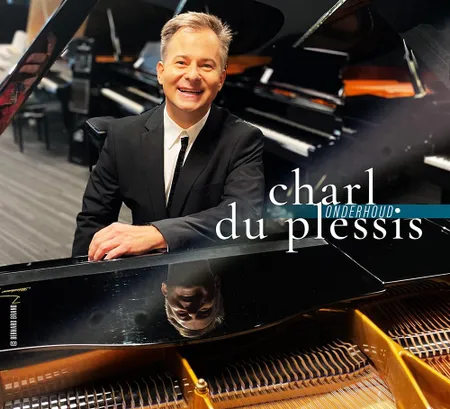IT'S noon and Pretoria is sizzling. The interior of Gerard Moerdyk's design, the Ooskerk, is more merciful. Amber stained glass windows tame the consuming light around him. Not a hair out of place, a crisp scent. In the pew, his articulation sounds like meditation.
Art kaleidoscope
Charl du Plessis' first memory is a ballet performance, with his parents, in Bloemfontein's Stadskouburg. “We sat in a very small box in the old theatre. I couldn't believe my eyes … everything tickled me; curtains, lights, changing decor, people singing and dancing. Like looking through a kaleidoscope, turning it … those colours and shapes. I remember it very well."
The Rosestad native was a latecomer. “My poor parents … no one in our family is musical or semi-artistic, and I wanted to entertain people. They were fantastic in their support of my passion. Bloemfontein had an incredible cultural life when I was a child. Every latest, greatest production was brought to the brand new Sand du Plessis Theatre. My parents patiently dropped me off and picked me up, feeding my passion.
“I was a boy soprano in the Bloemfontein Children's Choir. There was a Steinway grand piano in our house, a beautiful piece of furniture. My sisters learned to play it ghwar-ghwar for a year. I played terribly, making up my own stuff. At nine I start piano lessons. After my voice broke, the piano simply took over."
Lees hierdie artikel in Afrikaans:
Ignore bullies
“Those years in Grey College, being musical was not as cool as during the last 10, 20 years. It was definitely a stereotypical boy who wanted to play the piano, or sing … until matric it was not always easy in such a sports-driven school. The teachers and music staff were extremely positive and supported me well, but unfortunately not the children … elements of bullying were definitely present.
“Looking back now, it's fascinating how I could ignore it. I just continued; the calling and desire and creativity and dream world of music was far greater than the children's nonsense. There were many nights of tears at home … but it was fine. There were other fantastic things I could learn in Grey College."
Around 16, he told his father he was considering music as a field of study. “His first question was: ‘But what are you going to live on?' Before he died of a heart attack in 2006, he could at least see that I had achieved some success … and he was always very proud of that. Thank goodness it didn't turn out to be a defeat."
A to B is seldom a straight line
In matric, a professor from the University of Pretoria, Joseph Stanford, invited the gifted pianist to study with him the following year. Du Plessis moved to Pretoria, obtained his BMus degree and planned further overseas studies. Then one of his dad's business deals became a financial catastrophe. “I had to take care of myself and abandon my overseas studies."
He spent that December with his folks. “The phone rang, it was a Pretoria number … then there was this voice (which he imitates perfectly). ‘My name is Nataniël, you won't know who I am, I got your number from Wessel van Wyk … I'm looking for a new pianist.'"
Du Plessis watched his first Nataniël show at 12 and afterwards went boldly to the dressing room to ask for the artist's autograph.
“I was convinced I wasn't good enough and asked, ‘what about an audition?' ‘No, I'm not the Lord, you can just come. If it doesn't work, I'll tell you.' It's 24 years later and he still hasn't said anything. The opportunity rescued me financially and was an acceleration of my career. I was able to complete my honours and master's degrees in music, as well as my DMus at Tuks, and to start doing my own thing between our collaboration.
The power of music
“My parents did not have a deep knowledge of classical music but they did appreciate it. When I started to progress in piano, I had to practise these heavy, difficult pieces. The night before my exam they had to sit concert style, pay a R10 entrance fee: I play, they clap, I bow. Then one says: ‘My child, now play something nice for us.'
“To this day, I therefore understand when you present something too grandiose to an audience and miss the point. My parents' communication of resonating, the power of when someone recognises and can appreciate something, helped shape me.
“A big part of being a pianist happens when you're alone. Months, weeks of studying music in advance — as a pianist you have to play by heart. In that visualisation and preparation, you are already in a zone weeks before the performance, so focused, you know exactly how it will work … like in a play. The ideal is to be in the moment, to realise what is happening, how nice it is. When I enjoy it on stage, it radiates energy … a reciprocal transaction between me and the audience, fellow musicians, a conductor, the orchestra, stage staff.
“The power of it all lies in music.”
♦ VWB ♦
BE PART OF THE CONVERSATION: Go to the bottom of this page to share your opinion. We look forward to hearing from you.





To comment on this article, register (it's fast and free) or log in.
First read Vrye Weekblad's Comment Policy before commenting.